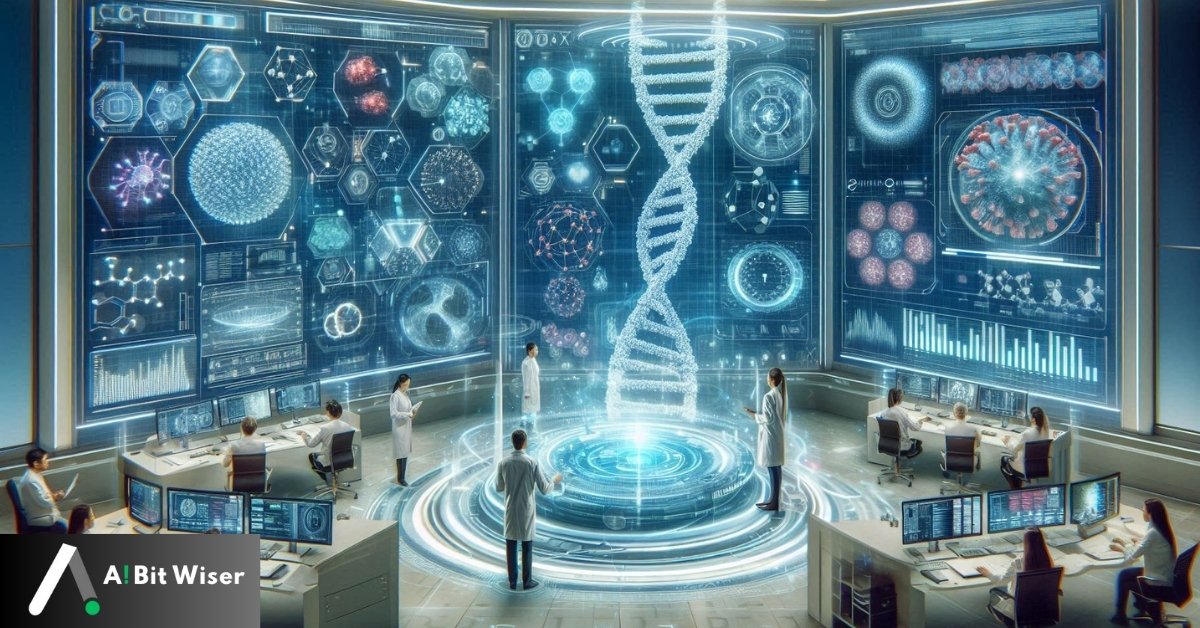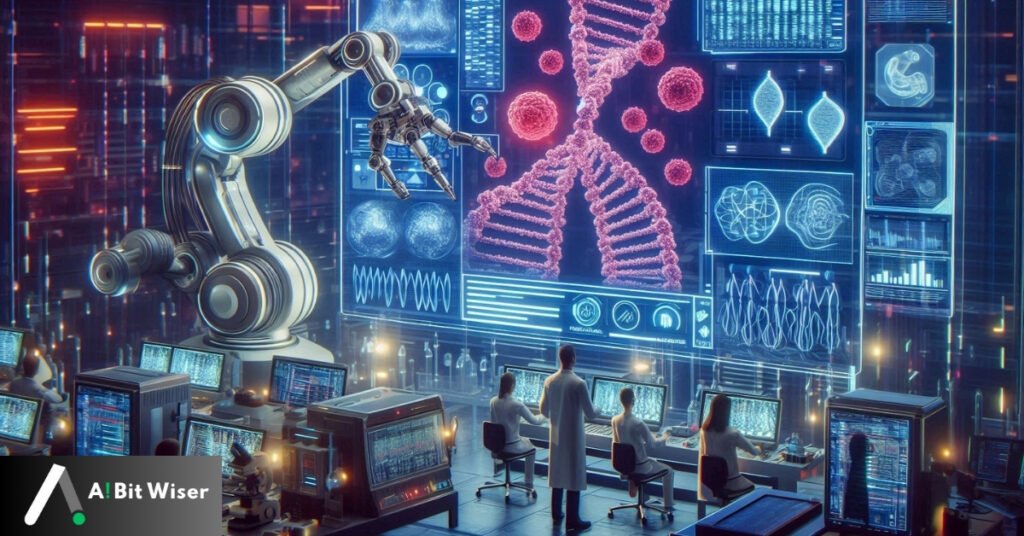Life Sciences Gen AI Use Cases: How AI Is Boosting 5 Life Industries?

The application of generative artificial intelligence is causing a significant revolution in the medical-scientific sector. The numerous life sciences gen AI use cases that are propelling creativity in fields like drug discovery, personalized medicine, and synthetic biology are some of the most fascinating breakthroughs. The current piece examines some of the most exciting uses of generative AI in the life sciences and demonstrates how these technologies are driving down costs while increasing efficiency.
Accelerating Drug Discovery and Design
Drug research is one of the most innovative life sciences gen AI use cases. Usually, the endeavor of creating a new medication takes over 10 years and involves substantial costs. This is changing quickly because of AI that is generative, which also makes drug research easier and more economical. Let’s examine more closely the main areas where AI is developing this discipline.
Molecule Generation for Drug Discovery
Enormous pharmacological collections can be analyzed by generative AI models to produce novel compounds that resemble drugs. Artificial intelligence (AI) can produce unique molecules with certain features that render them excellent candidates for interaction with proteins of interest, saving the manual examination of millions of substances. This capability increases the likelihood of discovering ground-breaking medicines by not only expediting the identification of interesting compounds but also creating completely new chemical regions for investigation.
Predicting Protein Structures for Targeted Drug Design
Artificial intelligence (AI) innovations, like DeepMind’s AlphaFold, are upsetting our insight into protein structures. Through the use of these models, scientists can precisely target disease-causing substances in their medication designs by forecasting the 3-D structure of proteins based on the amino acid sequences they contain. This capacity is crucial for creating successful therapeutics for diseases like cancer and neurological disorders, where precise predictions of protein structures are necessary for creating effective treatments.
Optimizing Lead Drug Candidates
Attractive potential medicines often need to be optimized after they are identified to improve their safety, accessibility, and effectiveness profiles. The limit of generative computer-based intelligence to foresee how little primary changes to a pharmacological particle will modify its viability permits drug organizations to productively create lead particles more. This approach diminishes the time and cost engaged with getting a medicine to showcase while improving the probability of viability.
Case Study: Insilico Medicine
Leading AI-driven drug development company Insilico Pharmaceuticals proved the value of life sciences gen AI use cases when it found a preclinical candidate for fibrosis in just 18 months. This quick advancement illustrates how AI is changing the drug development process in comparison to the conventional timeline.

Personalized Medicine and Genomic Analysis
The development of individualized healthcare, in which particular patients receive customized treatments based on their own hereditary and biological profiles, is greatly aided by the application of generative AI. Let’s examine how life sciences gen AI use cases are bringing this idea to life.
Interpreting Genomic Data for Tailored Treatments
The enormous volume of genomic data that needs to be examined to comprehend each patient’s distinct traits is one of the main obstacles in individualized healthcare. AI algorithms can examine this data and produce insights regarding genetic variants that could affect a patient’s reaction to particular therapies. AI’s capacity to recognize modifications in tumors that indicate a certain treatment plan makes it especially useful in the medical sector of cancer, where doctors may prescribe more accurate and potent treatments.
Designing Custom Treatment Plans Based on Individual Profiles
Artificial intelligence can make customized treatment regimens by consolidating hereditary, subatomic, and natural information, notwithstanding the comprehension of far-reaching data. Customized treatment regimens can be altogether more effective than generally applied procedures, particularly while overseeing confounded ailments like malignant growth, coronary illness, and immune system conditions. Experts are better ready to make individualized treatment designs that upgrade patient results since simulated intelligence is equipped for handling and breaking down a few informational collections immediately.
Case Study: Tempus
Accuracy medication startup Tempus utilizes life sciences gen AI use cases to assess clinical and genomic information, giving doctors the information they need to configure individualized therapy regimens for individuals with malignant growth. By zeroing in on the exceptional hereditary attributes of every patient’s malignant growth, this technique assists with further developing treatment viability and clinical outcomes.

Advancing Synthetic Biology
Manufactured science includes planning and designing organic frameworks for valuable purposes, and generative simulated intelligence is reforming this field. The combination of computer-based intelligence with engineered science is one of the more imaginative life sciences gen AI use cases, empowering headways in medical care, natural supportability, and modern biotechnology.
Optimizing DNA Sequence Design for Biological Tasks
Generative man-made intelligence can configure improved DNA successions for different natural errands, like the development of restorative proteins or the making of engineered organic entities. Overwhelmingly of natural information, man-made intelligence models can create groupings that further develop proficiency and efficiency. This is especially significant in fields like drugs, where high return creation of proteins can prompt more savvy treatments.
Engineering Novel Proteins for Therapeutic and Environmental Applications
One more astonishing area of engineered science is the improvement of novel proteins with explicit capabilities. Generative artificial intelligence can foresee how different amino corrosive arrangements will overlap into 3D protein structures, empowering the plan of proteins with new and valuable properties. These designed proteins can be utilized in restorative applications, for example, chemicals that assist with blending drugs, or in ecological applications, similar to proteins that separate poisons or reuse squander.
Case Study: Ginkgo Bioworks
Ginkgo Bioworks uses AI to engineer custom organisms for a wide range of applications, from producing industrial chemicals to developing agricultural solutions. Their work showcases one of the most forward-looking life sciences gen AI use cases, where generative AI accelerates the process of designing synthetic organisms for real-world applications.

Improving Biomedical Imaging and Diagnostics
Generative simulated intelligence is upgrading the field of clinical imaging, where precise and effective diagnostics can have a daily existence-saving effect. Among the significant life sciences gen AI use cases is the capacity to further develop imaging diagnostics by creating manufactured pictures and supporting the translation of intricate visual information.
Creating Synthetic Medical Images for AI Training
One of the critical difficulties in clinical imaging is the restricted accessibility of huge, commented-on datasets to prepare computer-based intelligence models. Generative computer-based intelligence can make engineered clinical pictures that are indistinct from genuine ones, permitting simulated intelligence frameworks to successfully be prepared more. This is especially helpful in uncommon illnesses, where genuine patient information might be scant.
Enhancing Disease Detection and Diagnosis
Automated thinking can assess clinical pictures, for example, X-rays, CT results, and pathology slides, to see indications of ailments like disease. Generative AI produces forecasts from these pictures by breaking down tremendous datasets, empowering clinicians to go with additional educated demonstrative choices. At times, computer-based intelligence models have shown higher exactness than customary indicative strategies, prompting prior identification and working on understanding results.
Case Study: PathAI
PathAI helps pathologists diagnose conditions like cancer by utilizing AI-powered technologies. PathAI reduces the possibility of human error by expediting the procedure and increasing diagnosis accuracy through the use of life sciences gen AI use cases such as synthetic data generation.
Enhancing Clinical Trials
Primer examinations are a pivotal piece of the procedure of growing new medications, yet they might be expensive and long. Life sciences gen AI use cases are working on the planning and direction of clinical primers, extending effectiveness, and reducing expenses.
Streamlining Patient Recruitment for Trials
In the development of new drugs, finding suitable people for clinical trials is frequently a bottleneck. AI can analyze huge datasets to determine which people are the best candidates for clinical trials based on their genetic composition, medical history, and other variables. This focused approach reduces recruiting timeframes and raises the probability of favorable study outcomes.
Simulating Clinical Trial Outcomes for Better Trial Design
Generative man-made intelligence models can recreate possible results of clinical preliminaries because of authentic information. These recreations assist drug organizations with planning more powerful preliminaries, foreseeing possible incidental effects, and expecting difficulties. By streamlining the preliminary plan, simulated intelligence assists with diminishing the dangers and expenses related to bombed preliminaries and speeds up the general medication improvement process.
Case Study: Atomwise
Atomwise utilizes artificial intelligence to anticipate the results of medication preliminaries before they even start, permitting drug organizations to advance their preliminary plans. This use of life sciences gen AI use case decreases the monetary dangers of bombed preliminaries and helps accelerate the method involved with putting up new medications for sale to the public.
Conclusion
Atomwise utilizes artificial intelligence to anticipate the results of medication preliminaries before they even start, permitting drug organizations to advance their preliminary plans. This use of life sciences gen AI use cases decreases the monetary dangers of bombed preliminaries and helps accelerate the method involved with putting up new medications for sale to the public.















